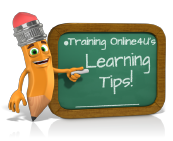As we move into January, many of us are starting to reflect on the year just passed and the year that’s about to come. We’re thinking about where we are right now and where we would like to be, and we’re starting to make plans on how we can get there.
For many of us, this involves further learning. Whether that’s because we want a change in career, a promotion or just to learn a new skill.
Here at Training Online 4u we would love for you to be able to make those goals a reality and not for you to have them on your list for next year’s resolutions.
We have complied a list of useful study tips to help with your learning. Let us know your thoughts.
1: Remove distractions! This is one we are all guilty of. Switch off the tv, move away from phones and iPads, give your learning the full time and attention it needs, and you will reap the benefits! That email can wait!
2: Choose your environment wisely. A nice, quiet, calming environment will help you focus your mind on the training you are undertaking.
3: Focus on mastery. For each class you take, try to grasp the material as deeply as possible. Push yourself to learn new topics, even if  they seem really tough at first. Aim to become a better learner than you are now!
they seem really tough at first. Aim to become a better learner than you are now!
4: Shake a leg. Lack of blood flow is one of the main reasons for lack of concentration, so if you have been sitting in one place for a while: get up, shake up, dance, move, jiggle and get that blood flow pumping back around. Then get back to it!
5: Food for thought. Make sure you have eaten enough to help your mind concentrate – especially foods containing protein as they ‘feed’ your brain. Lack of protein can cause headaches!
6: Sleep on it! REM sleep not only helps you rest and restore, but also helps with your problem-solving skills!
7: Change your ways! There are 3 main learning styles: visual, auditory and kinaesthetic. If one isn’t working for you, try another.
8: Associative learning. Use what you know to help you learn and apply what you don’t know!
9: Take a bath or shower. Yes, this is a surprising one but both activities have been proven to loosen up your mind and make it more receptive to new ideas.
10: Motivate yourself! Think about: Why you want to learn? What do you hope to achieve? Exploring why you want to learn helps you focus your mind on what you want to gain!
11: Don’t procrastinate! Don’t put off tomorrow what you could do today!
12: Be prepared! Get everything you need ready to learn so you don’t have to get distracted later!
13: Make notes. This helps you make sense of the content you are learning by putting it into your own words, and helps your brain compartmentalise it in order to remember it easily. Whether you do this the good old-fashioned way – pen and paper, or use a fancy app or gadget to help you, both are equally efficient!
14: Repetition. Complex contexts often require revisiting several times. Doing this in the correct way can really ensure that you retain the knowledge you need. Repeating the topic in several different ways ensures you are able to do this.
15: Test yourself. Part way through your learning, test your knowledge! This will reinforce the information you have just learnt.
16: Persistence. If something is difficult keep trying. After all Thomas Edison said: “Genius is 1% inspiration and 99% perspiration!”
17: Visualise a journey. Just as you do when you are learning to drive or walk to a new place, you visualise your landmarks so your able to remember where to go next time. Do the same in your learning journey – remember specific points along your journey to help you remember how to get to the end point.
18: Chunking. When we learn chunks of information together, we can store it more easily in our long-term memory. Our working short-term memory only holds 7 pieces of information at one time, but if we “chunk” information together then we are able to remember 7 chunks, meaning much more information!
19: Have fun! We retain more information when we are enjoying what we are learning! So, whatever the subject is that you want to learn, make it fun!
20: Interact. If you are interacting with your learning, you are more likely to retain the information than if you were just reading it.
21: Build your confidence. Start small. Build it up and as you do so your confidence will grow!
22: Plan your time. Schedule in your training sessions. Use a diary, a wall planner or a to-do list to help you break the learning down into manageable sections.
23: Look things up. Researching further about topics you don’t know is a great way to improve your knowledge.
24: Enjoy! Remember you are learning for a reason! Enjoy it!
All of our courses were built with these tips in mind. At Training Online 4U we incorporate all learning styles and using the latest e-learning technology we have created fun, engaging, interactive training that you can access anytime, anyplace, anywhere. You can pause, come away and restart at any time and a certificate is downloadable immediately upon completion.
And remember whatever it is you want to learn…enjoy!

